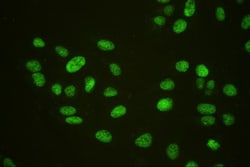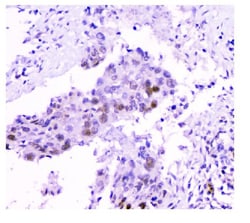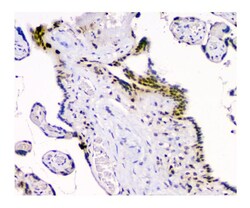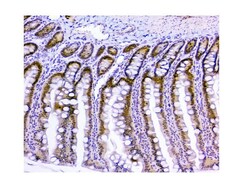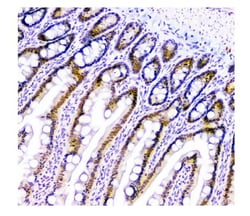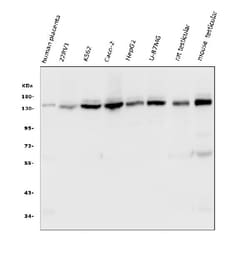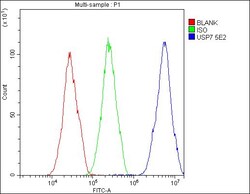Learn More
Invitrogen™ USP7 Monoclonal Antibody (5E2)
Mouse Monoclonal Antibody
Supplier: Invitrogen™ MA549190
Description
Adding 0.2 mL of distilled water will yield a concentration of 500 μg/mL. Positive Control - WB: human placenta tissue, human 22RV1 whole cell, human K562 whole cell, human Caco-2 whole cell, human HepG2 whole cell, human U-87MG whole cell, rat testicular tissue, mouse testicular tissue. IHC: human lung cancer tissue, human placenta tissue, rat intestine tissue, rat intestine tissue. ICC/IF: U20S cell. Flow: HepG2 cell. Store at -20°C for one year from date of receipt. After reconstitution, at 4°C for one month. It can also be aliquotted and stored frozen at -20°C for six months. Avoid repeated freeze-thaw cycles.
USP7 or HAUSP is a ubiquitin specific protease or a deubiquitylating enzyme that cleaves ubiquitin from its substrates. Since ubiquitylation (polyubiquitination) is most commonly associated with the stability and degradation of cellular proteins, HAUSP activity generally stabilizes its substrate proteins. HAUSP is most popularly known as a direct antagonist of Mdm2, the E3 ubiquitin ligase for the tumor suppressor protein, p53. Normally, p53 levels are kept low in part due to Mdm2-mediated ubiquitylation and degradation of p53. Interestingly, in response to oncogenic insults, HAUSP can deubiquitinate p53 and protect p53 from Mdm2-mediated degradation, indicating that it may possess a tumor suppressor function for the immediate stabilization of p53 in response to stress. Another important role of HAUSP function involves the oncogenic stabilization of p53. Oncogenes such as Myc and E1A are thought to activate p53 through a p19 alternative reading frame (p19ARF, also called ARF)-dependent pathway, although some evidence suggests ARF is not essential in this process. An intriguing possibility is that HAUSP provides an alternative pathway for safeguarding the cell against oncogenic insults.
Specifications
| USP7 | |
| Monoclonal | |
| 500 μg/mL | |
| PBS with 4mg trehalose and 0.05mg sodium azide | |
| Q4VSI4, Q6A4J8, Q93009 | |
| USP7 | |
| E.coli-derived human HAUSP/USP7 recombinant protein (Position: L258-D483). | |
| 100 μg | |
| Primary | |
| Human, Mouse, Rat | |
| Antibody | |
| IgG2b |
| Flow Cytometry, Immunohistochemistry (Paraffin), Western Blot, Immunocytochemistry | |
| 5E2 | |
| Unconjugated | |
| USP7 | |
| 2210010O09Rik; AA409944; AA617399; AU019296; AW548146; C80752; deubiquitinating enzyme 7; Hausp; Herpes virus-associated ubiquitin-specific protease; herpes-virus-associated ubiquitin-specific protease; herpesvirus-associated ubiquitin-specific protease; mHAUSP; protease; rHAUSP; TEF1; Ubiquitin carboxyl-terminal hydrolase 7; ubiquitin specific peptidase 7; ubiquitin specific peptidase 7 (herpes virus-associated); ubiquitin specific protease 7; ubiquitin specific protease 7 (herpes virus-associated); ubiquitin thioesterase 7; ubiquitin thiolesterase 7; ubiquitin-specific-processing protease 7; UBP; USP7 | |
| Mouse | |
| Antigen affinity chromatography | |
| RUO | |
| 252870, 360471, 7874 | |
| -20°C | |
| Lyophilized |
Your input is important to us. Please complete this form to provide feedback related to the content on this product.
